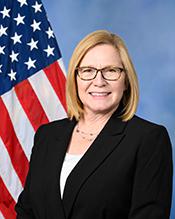US Representative
Michelle Fischbach Authored & Sponsored Legislation
Co-Sponsor of Legislation
US
Us Congress 2025-2026 Regular Session
Us Congress House Bill HB879
Introduced
1/31/25
Refer
1/31/25
Medicare Patient Access and Practice Stabilization Act of 2025
US
Us Congress 2025-2026 Regular Session
Us Congress House Bill HB925
Introduced
2/4/25
Refer
2/4/25
Dismantle DEI Act of 2025
US
Us Congress 2025-2026 Regular Session
Us Congress House Bill HB978
Introduced
2/5/25
Refer
2/5/25
Superior National Forest Restoration Act of 2025
US
Us Congress 2025-2026 Regular Session
Us Congress House Bill HB979
Introduced
2/5/25
Refer
2/5/25
Refer
2/5/25
Refer
2/5/25
AM Radio for Every Vehicle Act of 2025
US
Us Congress 2025-2026 Regular Session
Us Congress House Bill HCR12
Introduced
2/13/25
Refer
2/13/25
Supporting the Local Radio Freedom Act.
US
Us Congress 2025-2026 Regular Session
Us Congress House Bill HCR4
Introduced
1/28/25
Refer
1/28/25
Expressing the sense of Congress that tax-exempt fraternal benefit societies have historically provided and continue to provide critical benefits to the people and communities of the United States.
US
Us Congress 2025-2026 Regular Session
Us Congress House Bill HJR10
Introduced
1/3/25
Refer
1/3/25
This joint resolution proposes a constitutional amendment prohibiting total outlays for a fiscal year from exceeding total receipts for that fiscal year unless Congress authorizes the excess by a three-fifths roll call vote of each chamber. The prohibition excludes outlays for repayment of debt principal and receipts derived from borrowing. The amendment requires a three-fifths roll call vote of each chamber to increase the public debt limit. It prohibits a bill to increase revenue from becoming law unless it has been approved by a majority roll call vote of each chamber. The amendment also requires the President to submit an annual budget in which total outlays do not exceed total receipts. Congress may waive these requirements due to a declaration of war or a military conflict that causes an imminent and serious military threat to national security.
US
Us Congress 2025-2026 Regular Session
Us Congress House Bill HJR12
Introduced
1/6/25
Refer
1/6/25
Proposing an amendment to the Constitution of the United States to limit the number of terms that a Member of Congress may serve.
US
Us Congress 2025-2026 Regular Session
Us Congress House Bill HJR20
Introduced
1/15/25
Refer
1/15/25
Engrossed
3/3/25
Enrolled
5/5/25
Enrolled
5/9/25
Passed
5/9/25
Chaptered
5/9/25
Passed
5/9/25
Providing for congressional disapproval under chapter 8 of title 5, United States Code, of the rule submitted by the Department of Energy relating to "Energy Conservation Program: Energy Conservation Standards for Consumer Gas-fired Instantaneous Water Heaters".
Primary Sponsor of Legislation
US
Us Congress 2025-2026 Regular Session
Us Congress House Bill HCR1
Introduced
1/3/25
Engrossed
1/6/25
This concurrent resolution authorizes Congress to assemble at a place outside Washington, DC, during the 119th Congress if the Speaker of the House and the Senate Majority Leader agree that it is in the public interest. The concurrent resolution provides that the Speaker of the House and the Senate Majority Leader shall act jointly after consultation with the House and Senate Minority Leaders.
Page 8
of 9
